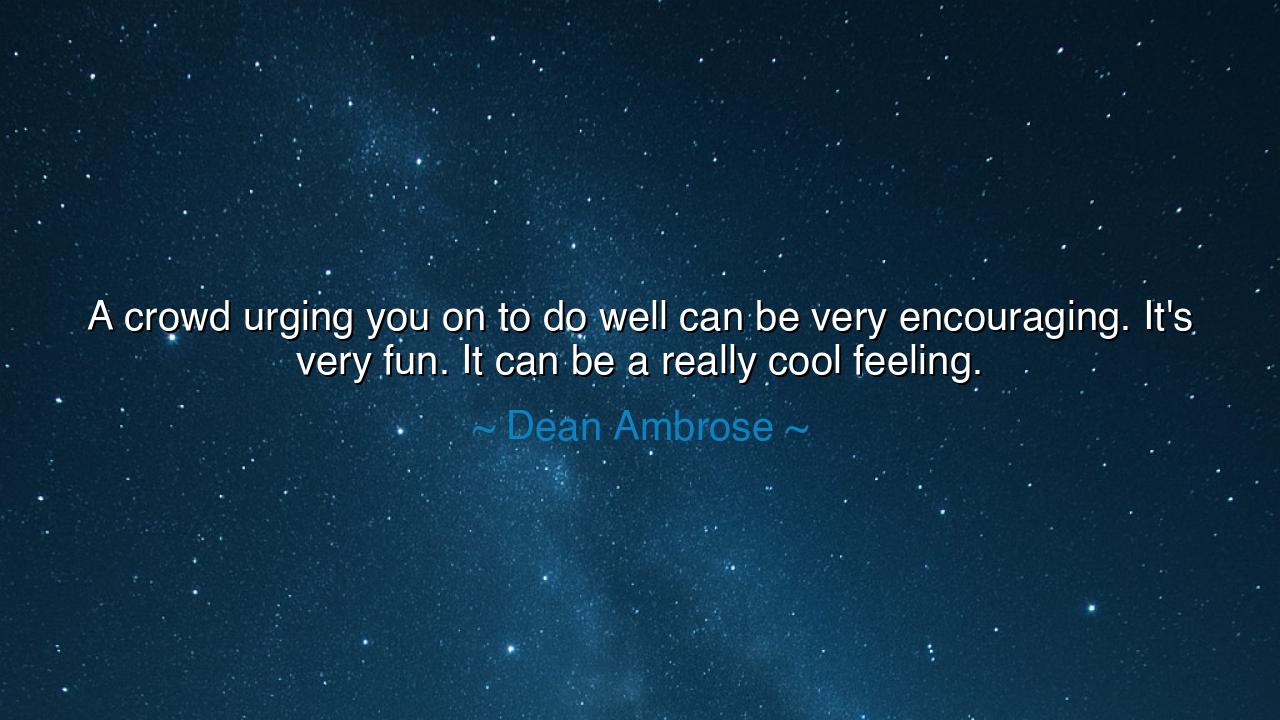
A crowd urging you on to do well can be very encouraging. It's
A crowd urging you on to do well can be very encouraging. It's very fun. It can be a really cool feeling.






The words of Dean Ambrose, “A crowd urging you on to do well can be very encouraging. It's very fun. It can be a really cool feeling,” carry within them the ancient pulse of human unity — the deep and primal bond between the one who stands before the many, and the many who lend their voices to the one. Though spoken in the arena of wrestling and sport, the truth it holds is older than the games of Rome and as eternal as the fire of Olympus. It reminds us that encouragement, when born from the hearts of others, is not merely sound and motion — it is energy made visible, a force that breathes courage into the soul of the performer.
In the time of the ancients, the crowd was not merely an audience; it was a living spirit. When warriors entered the coliseum, when poets recited their verses, or when orators lifted their voices before the people, the crowd became a mirror — reflecting back the courage, fear, and passion of the one who stood before them. The roar of the multitude could lift a man beyond his mortal limits, or crush him beneath the weight of their silence. Thus, Ambrose’s words remind us that the energy of others can ignite the fire within, turning ordinary effort into something extraordinary.
Think of Alexander the Great before the battle of Issus, standing amidst his soldiers. He did not simply command them; he spoke to their spirits. When his men shouted his name, when their cheers rose like thunder across the plain, their voices became the wind beneath his ambition. In that moment, Alexander was not one man — he was the embodiment of thousands. The crowd’s faith became his armor, their hope his sword. Such is the power of those who urge another onward: they transform the solitary into the unstoppable.
But there is a double edge to this truth. For the same crowd that uplifts can also demand, consume, and destroy. The history of heroes is filled with those who were exalted by the masses and later devoured by their expectations. The cheers that once inspired may become chains if one’s worth depends too much on their sound. Therefore, the wise performer, the true leader, must learn to draw strength from the encouragement of others without becoming enslaved to it. The voice of the crowd should lift you higher — but never define who you are.
In the ancient theatre of Greece, actors wore masks, yet behind them, they sought truth. The crowd’s applause was not their goal, but their compass — a sign that emotion and story had reached the human heart. Likewise, Ambrose’s words invite us to feel the beauty of that shared energy — to know the “cool feeling” of unity — but also to remember that the truest purpose lies not in being praised, but in doing well. The crowd’s roar is the echo of excellence, not its source.
Let us also remember Wilma Rudolph, the Olympic sprinter who once walked with braces on her legs as a child. When she finally ran before the cheering crowd of Rome in 1960, her victory was not hers alone — it was shared by all who believed in her. The crowd’s encouragement did not create her speed, but it magnified her strength. It turned years of pain into triumph, and her lonely practice into a song of glory. This is the sacred alchemy of human connection: when the voices of others merge with the spirit of the one, miracles are born.
Thus, the lesson endures: seek the voices that uplift you, not the ones that consume you. Surround yourself with those whose cheers are sincere, whose presence reminds you of your purpose. Let their energy be the wind that propels your sail, not the storm that tosses your ship. And when you find yourself standing before your own crowd — whether of thousands or just a few — breathe deeply, and let their faith kindle your courage.
For the crowd urging you on is not merely a gathering of people — it is the living proof that greatness is never achieved alone. It is the universe whispering, “You are seen. You are capable. Go on.” And when you rise to meet that call, when you channel their energy into creation, performance, or victory, you become what all heroes, ancient and modern, have always been — a spark ignited by the faith of others, burning brightly for all to see.






AAdministratorAdministrator
Welcome, honored guests. Please leave a comment, we will respond soon